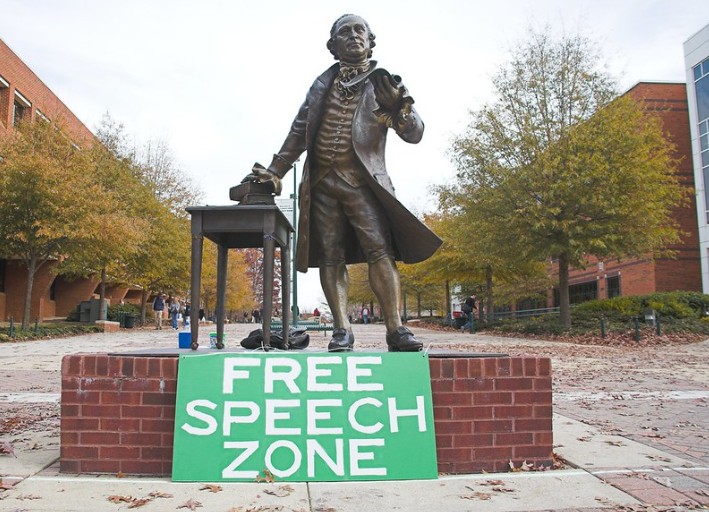The ability to tolerate ideas different from one’s own is a virtue that each generation must learn. It does not come naturally.
Unfortunately, today’s higher education establishments are failing to impart this skill. An increasing intolerance for unorthodox viewpoints on college campuses (demonstrated by “shout downs” of contentious speakers and policies punishing “offensive” or “biased” speech) is destroying our "marketplace of ideas," safe places in which to express controversial thoughts or theories.
In 2021, the Knight Foundation found that 65% of American students (10% more than in 2016) felt that their college stifled free expression based on fears that others might be offended. Conservative-leaning students were affected the most, likely because opinions outside today’s prevailing left-wing ideology are often called “offensive.”
More than just a disturbing social trend, this is a constitutional crisis.
Public universities are branches of the government. If left unchecked and unbalanced, they have the same potential as the government to oppress minority viewpoints.
Thus, policies banning speech on campus based on “bias” or “offensive” content have been consistently struck down as overly broad and vague, in violation of the First Amendment.
But universities are finding ways to suppress undesirable speech anyway. Many are creating "bias response teams," which are groups of school administrators authorized to investigate and publish “incidences” of “bias” speech.
This “effectively establish[es] a surveillance state on campus where students . . . must guard their every utterance for fear of being reported to and investigated by the administration,” the Foundation for Individual Rights and Expression explains.
Speech First, an organization committed to protecting student speech on campus, has challenged policies like these at several universities in federal courts across the country. Alabama’s Foundation for Moral Law has provided amicus support.
But Alabama’s students are facing these challenges, too.
Alabama A&M University and the University of North Alabama were both ranked among America’s “10 Worst Colleges for Free Speech” in 2019.
The University of Alabama at Huntsville designated small “free speech zones” on campus in order to limit expressive activities.
In 2016, the University of Alabama leveled substantial fees against the College Republicans to supposedly cover the cost of security for a controversial speaker they had invited.
That same year, a preacher on a sidewalk near the University of Alabama’s campus was stopped because he lacked a “Grounds Use Permit,” which would have required him to give the university 10 working days advance notice of his expression and receive approval of his message from a university-sanctioned organization.
Alabama is not impressing the importance of free expression – especially not free controversial expression – upon its youth. And it is clear why this problem has infiltrated our state: many of our leaders lack an appreciation for this fundamental right, favoring comfort and complacency instead.
Seeking to revive Alabama’s “marketplace of ideas,” House Rep. Matt Fridy (R-Montevallo) introduced the Campus Free Speech bill in 2019, intending to eliminate overly broad and ambiguous speech policies like those prohibiting “bias” or “offensive” content, eliminate “free speech zones” that limit expression, and provide a right of action for violations of the bill.
But Fridy had to defend much more than just his bill.
In debate at a committee meeting on the bill, Fridy and other supporters defended some of the most basic principles of the First Amendment freedom of speech against dangerously uninformed opponents. Debate raged over whether public colleges and universities are government entities subject to the First Amendment; whether the solution to “hate speech” is more speech of diverse viewpoints, rather than censorship; whether “hate speech” is inherently the same as dangerous speech; whether merely “disrupting” “campus culture” is a basis to silence certain viewpoints; whether anti-discrimination policies automatically outweigh the individual right to free expression; and whether there is a constitutionally protected right to not be offended.
Given this confusion, it is unsurprising that Alabama’s college administrators had still failed to comply with the Campus Free Speech Act by the end of 2022.
The truth about the First Amendment cannot just be taught on campus if it is disregarded in practice. This will result in a generation unequipped to preserve this fundamental building block of society.
Organizations like Speech First, the Foundation for Individual Rights and Expression, and the Foundation for Moral Law of Montgomery, Ala., are defending individual speakers and challenging unconstitutional policies to secure the future of freedom of speech. Find out how you can help them by visiting them online.
Katrinnah Darden is a Staff Attorney at the Foundation for Moral Law (www.morallaw.org). Those with constitutional concerns may call the Foundation at (334) 262-1245 or email katrinnah@morallaw.org.










